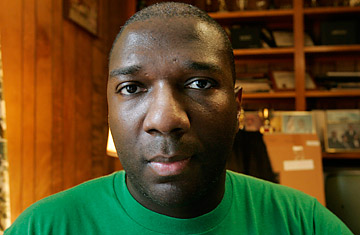
Alvin Greene, South Carolina Democratic candidate for U.S. Senate
Alvin Greene may be the only Democratic nominee in U.S. Senate election history to walk to his father's kitchen every time his telephone rings. And it rings every five minutes or so — supporters he'll never meet, television and radio bookers hoping to juice ratings and reporters trying to figure out what Greene means for South Carolina and America's troubled democracy. "I don't have caller ID," Greene tells a caller. He also doesn't own a cell phone or a computer.
As recently as Memorial Day, Alvin Greene was an unemployed 32-year-old, 13-year military veteran who had been involuntarily discharged from both the Army and the Air Force and was facing an obscenity charge for allegedly showing a teenage stranger online pornography in a college campus computer lab (Greene has denied comment, but he is fighting the charge). What he became after winning 59% of the vote in the June 8 Democratic primary is now in dispute. To Representative Jim Clyburn, the state's most powerful Democrat, Greene is a pod person of unknown origin — "someone's plant." To his older brother James Jr., Greene is nothing more than a loner with a dream of making good — "like someone coming up saying, 'I'm going to fly to the moon.' " To Vic Rawl, his well-funded opponent, Greene is the possible beneficiary of a historic voter-machine malfunction or, worse, a stolen election.
Greene maintains that the answer is much simpler. "I am the best candidate for the United States Senate in South Carolina," he says, hitting his talking points, as he is apt to do. "And I am also the best person to be TIME magazine's Man of the Year." He is speaking now, between trips to the kitchen, in the living room, while his 81-year-old father James Sr., barefoot under a flannel blanket, dozes on the couch. Suddenly the television flashes to Greene's face, with a Fox News announcer teasing an upcoming segment about the newbie's "mental state." This gets to Greene, who is tired of being treated by the press like a carnival act. "What about everyone else's mental state?" he asks, before breaking into a chuckle. "It seems like things don't apply to me. I'm the nominee, and 60% isn't 60% anymore."
Greene's election has become the whodunit of the political year, with a formal protest filed with the state Democratic Party, a legal challenge before the Federal Election Commission and endless local chatter about how a man with no real campaign, who gets information "mainly" from television, defeated the party-endorsed standard bearer, a retired judge who had printed 10,000 bumper stickers, logged 17,000 miles crisscrossing the state in his hatchback and paid for 220,000 autodial phone calls before election day.
While Greene's jury-rigged headquarters sits on 15 acres that his grandfather once farmed, the Rawl headquarters in Charleston, 80 miles to the south, consists of three rooms in an office park that look every bit like those of a winning campaign. At its peak, the Rawl operation employed about a dozen people, and even a week after losing, the place is humming, with three 20-something staff members tapping away on laptops beside a fresh pot of coffee. One wall is plastered with an oversize calendar showing planned campaign events through August, and on another wall hangs a motivational maxim: "What Have You Done for the Win Today?" Campaign manager Walter Ludwig, a silver-haired Beltway pro, is still working through what happened. "I thought over and over again whether I should have done something different," he says. "Maybe yes, maybe no, but the not knowing is really tough."
